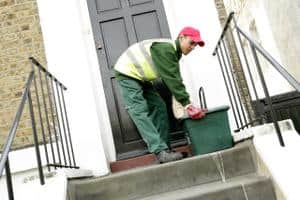Campaign group Friends of the Earth has attacked England's long-term ambitions for recycling and composting and called for the introduction of a statutory 70% target to match the example set in Wales.
However, trade associations – including the Environmental Services Association and ADEPT – have questioned the merits of adopting such a high target and claimed that the need for additional investment and a lack of political will means England is unlikely to follow the lead of the devolved administrations.
This failure occurred days after the Welsh Assembly Government agreed plans to set a statutory 70% recycling goal (see letsrecycle.com story). Scotland has its own 70% recycling target for 2025 under its Zero Waste Plan, although it is not legally-binding.
Becky Slater, waste campaigner at Friends of the Earth, told letsrecycle.com: “We would be very keen for the government to introduce a 70% recycling target and we would like to see that introduced for 2020. If the right effort was put in it would be definitely possible, certain parts of the country are already recycling that level.
At present, England does not face any self-imposed statutory target for recycling, although it aims to achieve a 50% recycling rate by 2020 under the Waste Strategy for England 2007. This matches the legal requirement to recycle 50% of its household waste by 2020 under the revised Waste Framework Directive, which is set to be transposed into UK law in December 2012.
However, Ms Slater claimed that the adherence to European goals showed a lack of ambition, given that some councils had already achieved over 70% in their recycling and composting performance.
She said: “The [European] target of 50% is not ambitious enough and we are hearing from lots of other organisations and campaign groups that they also support the ambition for 70%. So we think that it is something that the public supports.”
Ms Slater's sentiments were similar to those expressed last month by both the Local Authority Recycling Advisory Committee (LARAC) and consultancy Resource Futures that England should perhaps match Wales' long-term waste recycling ambitions (see letsrecycle.com story https://www.letsrecycle.com/do/ecco.py/view_item?listid=37&listcatid=5687&listitemid=56641).
“Good progress”
However, despite England's failure to achieve its goal for 2010, trade associations and industry experts said that England was unlikely to impose any higher targets for long-term recycling and composting.
The Environmental Services Association (ESA) – which represents waste management companies – claimed that “good progress” was being made in England “from a very low base” and that introducing a target – such as 70% goal by 2020 – would be constrained by cost and existing attitudes to waste and recycling.
A spokesman told letsrecycle.com: “Higher recycling rates, such as those being discussed by the devolved administrations, would be achievable but would require significant additional investment in recycling infrastructure, continued changes in household and business behaviour, and greater coordination of waste collection and treatment systems.”
And, the trade associations also stated that the most recent recycling and composting figure of 39.7% was achieved against a backdrop of falling waste arisings, caused in part by the recession but also due to increased efforts on waste reduction.
The ESA spokesman added: “It should be noted that the latest Defra figures suggest that there was a 2.7% fall in household waste generation, which is of course a source of far greater environmental benefits and is at the top of the waste hierarchy, while at the same time there was a drop of almost 10% in the amount of municipal waste sent to landfill.”
Echoing this sentiment, John Woodruff, chair of the National Association of Waste Disposal Officer, said: “We are seeing a recessionary impact on the level of waste. So I think that 40% is the affect of a recessionary impact on waste and work on waste minimisation. And, the lightweighting of recyclables and the reduction packaging.”
Policy
Julia Barrett, chair of the waste panel for the Association of Directors, Executives, Environment, Planning and Transport (ADEPT), claimed that the imposition of a long-term statutory target for council recycling rates would clash with the coalition government's ideology around localism.
She said: “Whatever we think, it isn't going to happen because the coalition government is very much about the agenda of localism, which is local choices by local people and they are also intent on lessening top down bureaucracy and we have seen that in the abolition of the comprehensive area agreements.”
Ms Barrett added that, even though it is partly the case in Wales and Scotland, England has a very diverse topography and this could prove an issue if a densely-populated urban area was given the same recycling target as a largely rural local authority.
“We have already seen that there are some councils that are close or are breaching 70% recycling but you have some very built up and urban areas with lower rates,” she said.









Subscribe for free